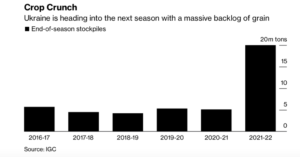A prolonged military conflict in the Middle East could potentially upend key commodity markets due to Iran’s control of the Strait of Hormuz, one of the world’s most important trade…
Lifting Black Sea Port Blockade Only Way to Prevent Food Shortage, Ukraine Says
Financial Times writer Max Seddon reported today that, “Ukraine has warned that the world faces a critical food shortage unless Russia lifts its Black Sea port blockade, as improvements to other transport options would only enable it to deliver a fraction of its total grain stockpile.
“Oleksandr Kubrakov, Ukraine’s infrastructure minister, told the Financial Times that ‘all of our activity won’t cover even 20 per cent of what we could do through the Black Sea ports.’
“Ukraine and its western allies are searching for ways to get up to 20mn tonnes of grain out of the country and clear storage space for this year’s harvest. The crisis threatens tens of millions of people in countries across the Middle East and Africa that rely on Ukraine’s cereals.”

The FT article noted that, “Kyiv has discussed sending up to 4mn tonnes of grain a month via Belarus, which uses the same railway gauges, and on to a port in Lithuania, according to a government briefing document seen by the FT. But the plan is politically unpalatable because Belarusian leader Alexander Lukashenko let Russia use his country as a staging post for its invasion of Ukraine.
“Though export capacity via the new routes is rising, EU diplomats estimate that Ukraine can only export about 5mn tonnes of grain by the end of the summer, leaving the rest of the last harvest at risk of rotting and making it more difficult to store this year’s.”
Reuters News reported yesterday that, “Russian President Vladimir Putin on Friday denied Moscow was preventing Ukrainian ports from exporting grain and said the best solution would be to ship it through Belarus, as long as sanctions on that country were lifted.”
The Reuters article indicated that, “Earlier on Friday, Belarus leader Alexander Lukashenko said Minsk was ready to allow the transit of Ukraine’s grain to German, Polish, Baltic or Russian ports via its territory if in return it was allowed to ship Belarusian goods from those ports.”
Meanwhile, Reuters writer Mark Trevelyan reported yesterday that, “Senegal’s President Macky Sall said Russia’s Vladimir Putin had told him on Friday he was ready to enable the export of Ukrainian grain to ease a global food crisis that is hitting Africa especially hard.”
And the Associated Press reported yesterday that, “Putin on Friday proposed several corridors to allow foreign ships safely to leave ports along the Black and Azov seas. He said Odesa and other ports under Ukrainian control could be used for exports after mines are removed and also those now under Russian control – Berdyansk and Mariupol. He also suggested moving grain through other countries such as neighboring Belarus.
“Ukrainian Foreign Minister Dmytro Kuleba said Friday that Ukraine was ready to create the necessary conditions to resume exports from Odesa, the country’s largest port.”
Elsewhere, Reuters writer Daren Butler reported yesterday that, “Turkey expects progress on a plan to unlock grains exports from Ukraine’s Black Sea ports when Russia’s foreign minister visits next week and both Moscow and Kyiv want a solution despite their conditions, a senior Turkish official said.
“Though hurdles remain – such as payment mechanisms for the agricultural products and mines floating in the Black Sea – the official said Moscow could take further positive steps after it said on Thursday it was open to the plan.”
The Reuters article added that, “Turkey neighbours Ukraine and Russia at sea and has said it is ready to take on a role within an ‘observation mechanism‘ if a deal is reached. That could involve a Turkish naval escort for tankers leaving Ukraine and transiting Turkey’s straits.”
Also yesterday, New York Times writer Elian Peltier reported that, “European leaders have accused the Russian president of creating a global food crisis by blocking wheat exports and seizing Ukrainian grain, all the while trying to blame shortages on sanctions imposed by the United States and the European Union.
“Global food stocks were already low before the invasion, and the war has made the shortfall worse. African countries import more than 40 percent of their wheat from Russia and Ukraine. The United Nations says food prices worldwide are 23 percent higher than a year ago, reflecting the tight supply.”





